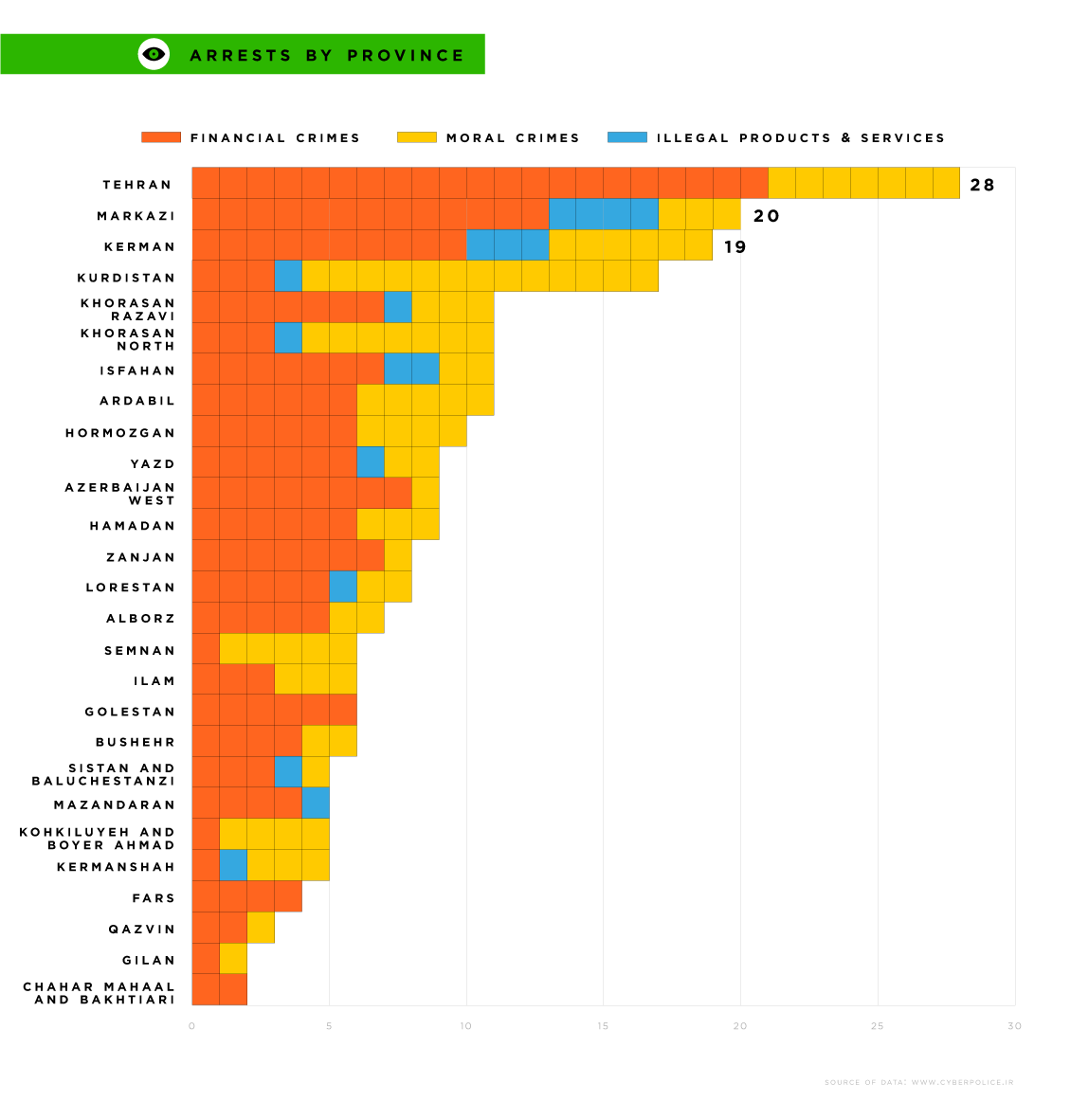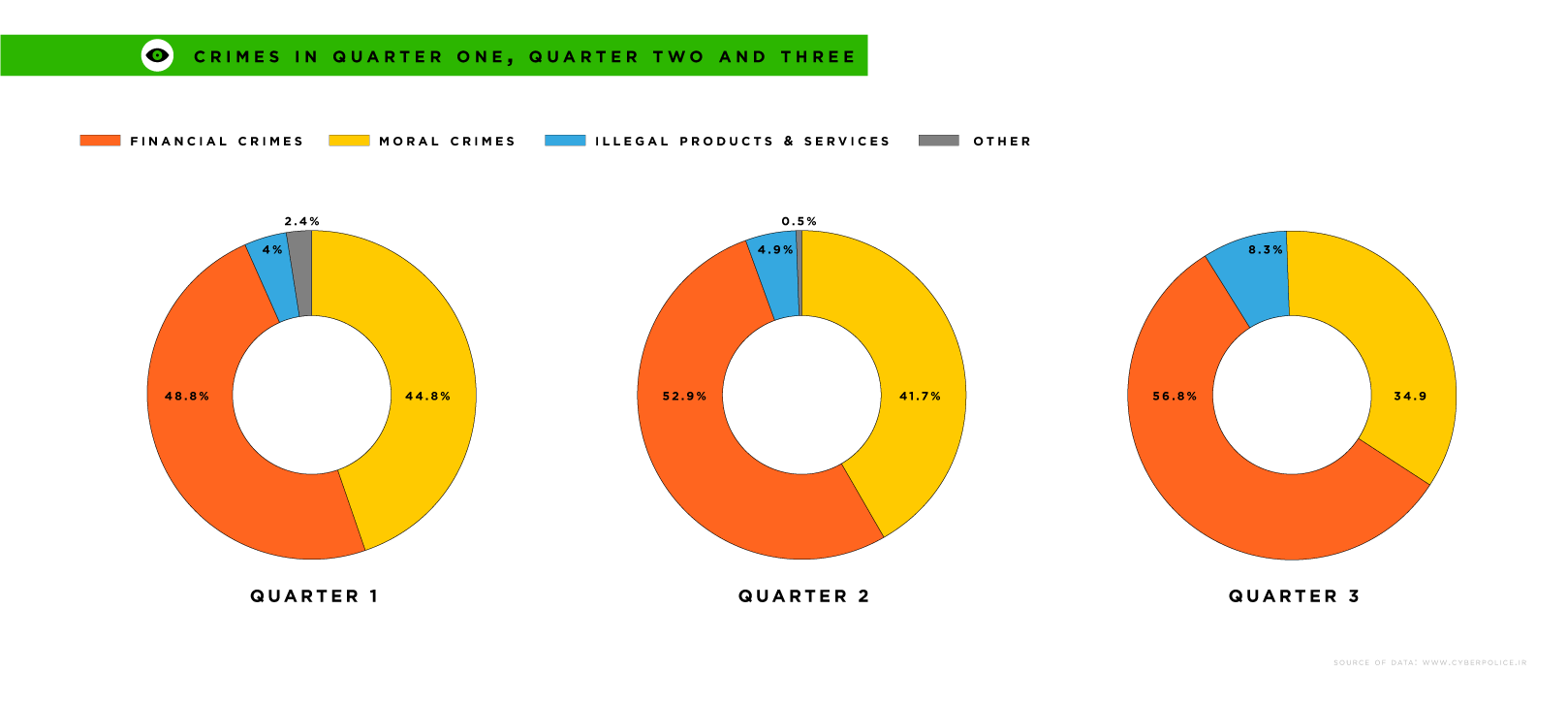Hello, and welcome to our latest edition of FATAwatch — our quarterly report casting an eye over the latest activities of Iran’s Cyber Police (or FATA). In this edition, we take stock of FATA’s ongoing crackdown on misinformation and disinformation online, as well as renewed efforts to put the squeeze on the Instagram celebrities pushing at the state’s moral red lines.
The data presented in this edition was collected from FATA’s official website. We previously published two quarterly reports examining January — March 2019, and April — June 2019.

Between July — September 2019, 244 arrests were reported by FATA officials on the organisation’s website; slightly lower than the 253 arrests reported in the previous quarter.
As in the last quarter, the vast majority of criminal cases described were associated with activities on Instagram. Also in line with our findings from last quarter, we have classed the majority of violations reported by FATA in this quarter as “financial crimes”, in that they relate to fraud or extortion.
Our full methodology and a definition of all the terms used in this report is available in our first edition of FATAwatch, available here.


Consistent with our findings in the previous quarter, Instagram continues to be the platform associated with the most criminal incidents named by FATA. Since the judiciary’s ban of Telegram in April 2018, and the eventual demise of ‘forked’ censored domestic Telegram clients in 2019, it appears that FATA has devoted less and less attention to Telegram, suggesting that authorities now perceive Instagram to be a more pervasive threat.
As previously, no domestic messaging apps are associated with any of the criminal cases, with international platforms being the main target of many FATA bulletins. However, as in the last quarter the classified advertising platform Divar features on numerous bulletins, with 22 arrests made related to the platform in this quarter.
In February, FATA called for the blocking of access to Divar, claiming that 20% of cybercrimes nationwide take place on it, and similar websites. FATA has indicated that the platform is responsible for the listings published by users.

Tehran once again tops all other provinces this quarter with regard to the number of arrests made by FATA. By contrast, for the last nine months Qom has remained the only province not to record a single FATA arrest. This is particularly surprising, given that in October 2018 FATA reported that its forces in Qom had arrested 117 people over a period of six months.
On July 24, the Tehran Police Chief General Hussein Rahimi claimed that 2,000 people engage with the Tehran Branch of FATA every day. Rahimi also added that in the first six months of 1398 (Iranian Calendar) there has been a 120% increase in cybercrime in Tehran.
With the expansion of digital services and growing internet access, it is perhaps not surprising that these rates are continuing to rise. However, as these crimes continue to grow commonplace, we expect that FATA’s role in law enforcement (and its powers to monitor and regulate online spaces) are likely to expand further.

Financial crimes, including online theft and extortion remained the most prominent target of FATA’s investigations over the course of the past three months, with these arrests constituting the majority of FATA arrests in 20 provinces nationwide.

On August 19, FATA’s National Chief General Vahid Majid announced that 50 new FATA offices would be built nationwide. Although he did not specify the locations of these new branches, he stated that they would primarily target deprived and remote regions. Majid said that the goal of establishing these new FATA offices was to “increase public trust”, “fight cyber- and financial crimes”, and to “prevent social and cultural damage from cyberspace”.
Over the last three quarters, we’ve observed that FATA boasts about uncovering highly localised criminal cases by monitoring activities in local groups, pages or channels. The expansion of local branches may further develop FATA’s ability to monitor and intervene in Iranian citizens’ online spaces.

On July 28 the National Chief of FATA, General Vahid Majid, announced that FATA had launched a programme last year to monitor the activities of Iranian Instagram celebrities , and to deliver warnings to them over their content when necessary. Majid stated that this programme will continue, and that FATA will continue to intervene in line with its existing policies.
In September 2018 Filterwatch highlighted how a number of famous Iranian Instagrammers had started wearing more conservative hijab after receiving warnings from FATA. In July 2018 the popular Instagram dancer Maedeh Hojrabi was detained and forced into a televised confession for posting videos of her dancing in her room, an incident that sparked widespread condemnation domestically and internationally.
Such policies are designed to threaten and intimidate online users, and to prevent them from posting or sharing content that does not comply with state-defined moral and cultural values. In such a context, self-censorship becomes a powerful force limiting freedom of expression online.

FATA continues to claim that it is working to combat rumours and the spread of false information by arresting citizens deemed responsible for misinformation and disinformation. As we detailed in our last report, the lack of fair and transparent processes in the implementation of these policies can discourage citizens from voicing real concerns on social media, for fear of arrest.
In this quarter two reported items highlight this issue. Firstly the September arrest of nine Telegram administrators of the channel ‘Aamak’, in Kurdistan province. This channel claims to publish information about government officials in Kurdistan. According to FATA, the channel was responsible for spreading false information, and FATA took action after 15 individuals and 10 organisational representatives lodged formal complaints against the channel.
The second incident took place in September in Lorestan Province, where FATA arrested an individual who set up an Instagram page which criticised a member of staff of a provincial mayoral office, attracting more than 17,000 followers.




